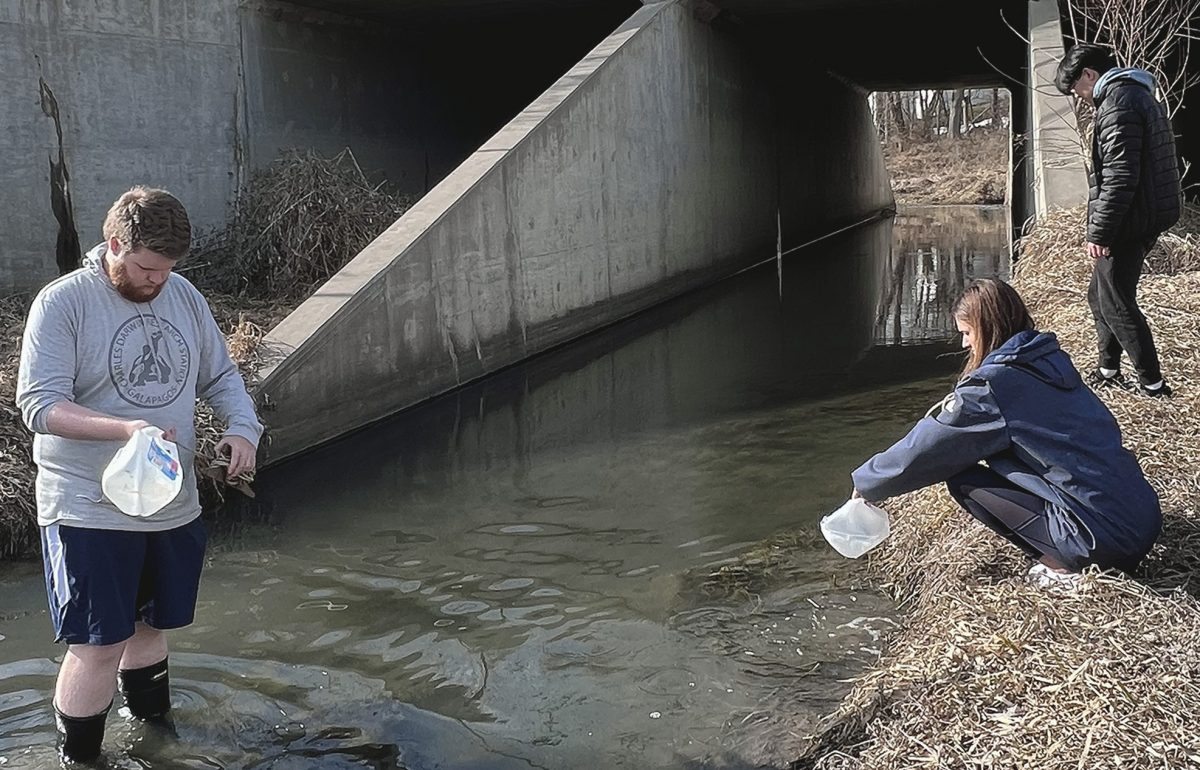On the ground floor of Olin Hall, students work on research projects, environmental science course studies and all things sustainability in a compact water quality lab spanning 300 square feet. In February 2025, the Roy J. Carver Charitable Trust awarded Drake University a $175,000 grant for the lab that will facilitate an expansion to triple the number of students who can utilize and benefit from the facility.
Students should be able to make use of the 200-square-foot increase and new equipment in the fall of 2025, with plans set to implement reforms this coming summer.
“We’re in a pretty small space now. We can accommodate about four people, and if they’re working, it’s tight,” said Claire Hruby, assistant professor of environmental science and sustainability. “With more students, we can handle more samples.”
Students under Hruby have a multitude of projects underway in the present lab, which often involve collecting water from rainstorms and watershed areas all across Iowa. Currently, the team is processing samples for basic water quality parameters, primarily looking at chloride, how much salt is in the water and E. coli, a key bacteria indicator of fecal pollution. Additionally, the aquatic branch of the environmental science department has connected with chemistry and biology disciplines to test water samples for pathogens and genetic sequences that identify sources of fecal contamination.
Hruby said that updated gear in the lab will expand the horizons of techniques like ion chromatography, an analytical process that detects and quantifies ions in water samples. Through interactive learning experiences, work in the lab aims to collaborate with local communities by providing them with important insights into their role in preserving and improving Iowa water resources. Hruby said that the students and faculty in the lab work with many different partners including the Department of Natural Resources, the Department of Agriculture and Polk County Conservation.
“We are small, and we are local. So we expect to really participate in a lot of the local water quality improvement efforts that are happening, [such as] efforts to improve recreational opportunities and make sure the fish that we folks are eating are safe, things like that,” Hruby said. “We can do a lot locally.”
Junior Alex Colby is the hydrology lab manager and an environmental science major on the aquatic and earth sciences track. She has a particular interest in wetlands, specifically fens.
On top of the responsibility of washing dishes in an outdated lab with no dishwasher, just a tiny sink at hand, Colby’s main role as the lab manager is to ensure the lab is well-stocked and maintained. Colby finds the immersive work of the lab — going out in the fields, collecting samples, and processing them in-house — extra rewarding for her personal and professional growth because she directly participates in the entire process.
“Having just this opportunity to work underneath Dr. Hruby, be the lab manager, teacher’s assistant, everything like that, it really gives that extra push. It’s really hard to say no to somebody who has all of that experience,” Colby said.
Colby’s fascination with water began as a volunteer in search and rescue of missing people. She excelled at waterway searches, given her background in environmental skills, and from there transferred to Drake from Des Moines Area Community College, worked in wetlands with the Iowa Department of Natural Resources and became deeply captivated by fens. Following her studies and experience in the lab, Colby plans to pursue her PhD.
“I’d say another thing, too, is we’re doing work that generally PhD students do,” Colby said. “I feel like this really shapes my future to know what to expect from grad school as well.”
Colby is excited about the ways the lab will benefit STEM students and the broader Drake community, emphasizing its role in preparing students for the future. She looks forward to seeing future generations take advantage of the opportunities it provides.
“I always encourage people from other departments, if you have water quality-related questions, come over. If you want to know something, come over,” Colby said. “If you want to just look, come over. I’m super inviting to other departments just to come over and hang out and learn even just some more science stuff that they want to learn. I know that our lab’s small, but I try.”
Given the expansions to the laboratory come the fall, those learning-based endeavors will become easier, as outlined in the Environmental Science and Sustainability department’s plans for the lab.
The Roy J. Carver Charitable Trust is dedicated to higher education scholarships and enriching learning opportunities and has funded other capital projects on campus before. In a competitive process, there were two phases of proposals to the Carver Trust, and of the full proposal Drake was awarded a scholarship for expanding the hydrology lab.
In Iowa, the second largest state in agricultural revenue, water supplies face prominent issues like pollution from agricultural runoff, waterborne diseases and poor ecosystem health. The Iowa Department of Natural Resources released a 2024 assessment summary that indicated that more than half of Iowa’s tested streams and lakes do not meet the needs of designated uses, may that be recreational, aquatic, drinking water or other uses.
Owing to the Carver Charitable Trust, this lab will help address large-scale water quality issues, enabling students and researchers to monitor local water quality. Beyond fostering passion and learning, it is an experience that empowers students to engage with current sustainability issues and drive positive change by improving water quality, one waterway at a time, according to Colby.
“[Our lab] is really essential because we can allow for students to get hands-on experience,” Colby said. “So they kind of have a better understanding of that kind of stuff. … The whole entire aspect of the lab, is we want people to come here. We want them to feel welcome. And they can come in here, and they can learn.”







